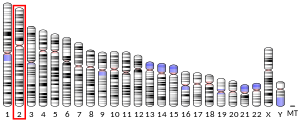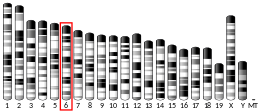From Wikipedia, the free encyclopedia
Protein-coding gene in the species Homo sapiens
WW domain-binding protein 1 is a protein that in humans is encoded by the WBP1 gene .[ 5] [ 6]
The globular WW domain is composed of 38 to 40 semiconserved amino acids shared by proteins of diverse functions including structural, regulatory, and signaling proteins . The domain is involved in mediating protein-protein interactions through the binding of polyproline ligands.
This gene encodes a WW domain binding protein, which binds to the WW domain of Yes kinase -associated protein by a conserved region: XPPXY motif. The function of this protein has not been determined.[ 6]
Gerhard DS, Wagner L, Feingold EA, et al. (2004). "The status, quality, and expansion of the NIH full-length cDNA project: the Mammalian Gene Collection (MGC)" . Genome Res . 14 (10B): 2121–7. doi :10.1101/gr.2596504 . PMC 528928 PMID 15489334 . Ludes-Meyers JH, Kil H, Bednarek AK, et al. (2004). "WWOX binds the specific proline-rich ligand PPXY: identification of candidate interacting proteins" . Oncogene . 23 (29): 5049–55. doi :10.1038/sj.onc.1207680 . PMC 4143251 PMID 15064722 . Ota T, Suzuki Y, Nishikawa T, et al. (2004). "Complete sequencing and characterization of 21,243 full-length human cDNAs" . Nat. Genet . 36 (1): 40–5. doi :10.1038/ng1285 PMID 14702039 . Strausberg RL, Feingold EA, Grouse LH, et al. (2003). "Generation and initial analysis of more than 15,000 full-length human and mouse cDNA sequences" . Proc. Natl. Acad. Sci. U.S.A . 99 (26): 16899–903. Bibcode :2002PNAS...9916899M . doi :10.1073/pnas.242603899 PMC 139241 PMID 12477932 . Jolliffe CN, Harvey KF, Haines BP, et al. (2001). "Identification of multiple proteins expressed in murine embryos as binding partners for the WW domains of the ubiquitin-protein ligase Nedd4" . Biochem. J . 351 Pt 3 (3): 557–65. doi :10.1042/0264-6021:3510557 . PMC 1221394 PMID 11042109 . Chen HI, Einbond A, Kwak SJ, et al. (1997). "Characterization of the WW domain of human yes-associated protein and its polyproline-containing ligands" . J. Biol. Chem . 272 (27): 17070–7. doi :10.1074/jbc.272.27.17070 PMID 9202023 . Pirozzi G, McConnell SJ, Uveges AJ, et al. (1997). "Identification of novel human WW domain-containing proteins by cloning of ligand targets" . J. Biol. Chem . 272 (23): 14611–6. doi :10.1074/jbc.272.23.14611 PMID 9169421 .




